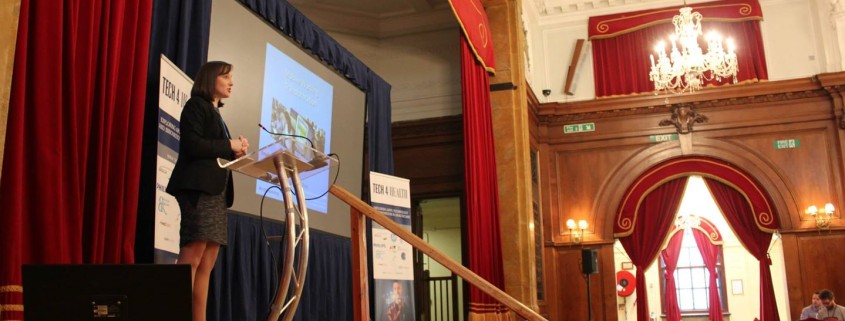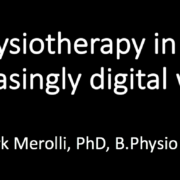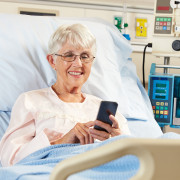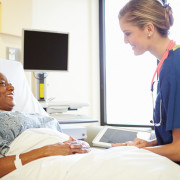Be Brave, Stand Up and Talk About It: Conference Presentation Tips
Melissa Andison, @mjandison
I’m standing behind the lectern. I look out to the audience. They stare straight back at me; eager looks on their faces. I can see their smart phones, they’re all ready to critique and tweet my every word. I have butterflies in my stomach, my heart is pounding and my legs are shaking. I take a deep breath, smile and begin my presentation.
For many clinicians, speaking at a conference is a daunting task. We are comfortable with conducting one to one treatments with our patients and their family members. We feel at ease running group therapy sessions and would not bat an eye lid at speaking with our colleagues at a case conference, but talking to a large, diverse professional crowd sends many of us running for the hills.
I have been invited to speak about health technology, in particular mobile working. I love talking about digital health. As a clinician and as a patient, I have had first-hand experience of the benefits. This new area of practice excites me and I wish to share the passion I have. This is what drives me to seek opportunities to talk with my peers in health and social care.
Overcoming my fear of public speaking has taken time, practice and the support from colleagues. Along the way they have given me some valuable guidance. When I am preparing to speak in front of an audience I always think back to their advice to help build confidence in delivering my message.
Speak from the heart
I was asked to join an event facilitated by Deloitte called ‘Thinking Patients: The digital future of community healthcare.’ Night after night I worked on what I wanted to say. How could I get across my experience? I wasn’t confident I had it right. My CIO at the time, Mr. Bill McAvoy, Director of WWM Consultancy, was also joining the event, so I emailed the ‘script’ I had written and asked how he was preparing. He replied to me by saying ‘I’m just going to speak from the heart.’ At the time, this left me feeling even more nervous. Did I have the knowledge and expertise to be able to do this? I had rehearsed a whole speech, but that evening when I found myself sitting around a board room table I realized it wasn’t going to be the right environment for what I had prepared. I remembered Bill’s words ‘speak from the heart.’ So, I folded up my notes and that is what I did. To my surprise my message was well received because it was real and passionate.
Something to take home
My colleagues and I had two abstracts selected to present at an International Digital Health Conference. We were very excited as the event attracted delegates from around the World. My mentor and good friend Ms. Liz Francis, a Service Re-design Manager and Clinician, who co-authored the abstracts, steered our preparations in the right direction. Liz directed us to not make the presentation too complex; to just keep it simple. She warned that a PowerPoint loaded with text was not going to be read by the audience and she emphasised that the slide deck needed to be smart, visual and informative. Liz made us think about our different backgrounds and unique contributions and how we could reflect that in the presentation. This was important, as the audience would be made up of different professionals each with different interests. The most important advice Liz shared was to make sure we were giving the audience something to take away. She stressed how essential it is to ensure that people who have given up their time to listen deserve something from our lessons learnt. Utilising Liz’s strategies we put together two very unique and powerful presentations.
Who are you doing this for?
I am very fortunate to have a good friend and colleague who I can consider my moral sounding board, Ms. Helen Cherry, Registered Nurse and Queen’s Nurse. She is a master in enabling communication and connecting. When I practice, Helen helps to time my presentations; she guides me to keep it short, sharp and to the point. Helen’s creativity helps me to think about doing things differently. Helen’s passion is making sure that communications are accessible to all. For example, Helen says to think about the members of the audience who may have visual and hearing difficulties. Helen’s advice is to check the volume, lighting, text size and caption all videos. Helen’s tip is always ask if there is going to be a Speech to Text Reporter (STTR) at the event, as this benefits the audience and provides a transcript of the presentations. Helen guides me to never lose sight of why I am doing this. She reminds me that my presentation message always has to come back to how to engage and empower our patients and strive for better health outcomes.
Last month I spoke at the Tech4Health Summit in London. I found myself in the minority of the list of speakers – female and a clinician. I saw this as a brilliant challenge and wanted to make an impact. I utilised the words of wisdom from my colleagues to help shape my message and some additional techniques to prepare my presentation.
Here are the key strategies I used to prepare:
- Know your audience – Research who you will be speaking to. Brainstorm what you think they may want to get out of the event. Take the time to anticipate the questions you think they may ask.
- Know the other speakers – Investigate what they are talking about to interweave common themes, but to avoid duplication. You don’t want to be giving the audience repetition of information.
- Tell a tale – Every good presentation has a beginning, middle and end. Give examples from real life, talk about real people and show examples of real change.
- Make it visual – Words may help to paint a picture; a picture can say a thousand words; but video footage will make the story memorable.
- Rehearse – Practice in front of a mirror, audio record your presentation or even film yourself. This is probably the most confronting thing you can do, but insightful and an effective way to make changes to bad habits.
- Rent a crowd – Make time to carry out a few practice runs. Find a free room and invite work mates to sit in while you practice. This is a great way to receive constructive feedback.
- Know your time limit – Keep to the time limit by making it sharp and to the point. Time yourself. Allow time for a few questions and enjoy the interaction with the audience.
- Take away message – Make sure you give the audience something to take away – tips, strategies and /or resources to be able to try something new for their practice.
- Be creative – Try different presentation programs like PowerPoint and Prezi. Experiment with new ways of presenting – start with a story or ask the audience questions.
- Speak from the heart – Don’t be afraid to speak with passion. You will instill this in your listeners. They will remember you and your message so much more.
As clinicians, our focus is on delivering high quality healthcare for the people we work with. We work in fast paced services with ever increasing productivity demands. This makes it challenging to capture the good work we do, let alone to take time away to attend an event, but we can’t let this be an excuse. Giving back to the wider healthcare community should be a moral obligation of us all. Doing a presentation is just one way to share your lessons learnt and celebrate your achievements. I hope you can use these words of wisdom from my colleagues to help shape your own message and presentation for an event. It is a very rewarding experience.
- Be brave.
- Stand up and talk about it.
Melissa Andison is Director OTTech Healthcare Consultancy / Transformation Clinical Lead at Central London Community Healthcare NHS Trust / Occupational Therapist / Mobile Working Advocate









Leave a Reply
Want to join the discussion?Feel free to contribute!